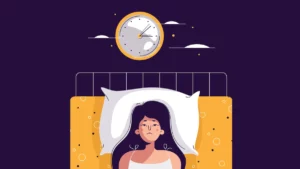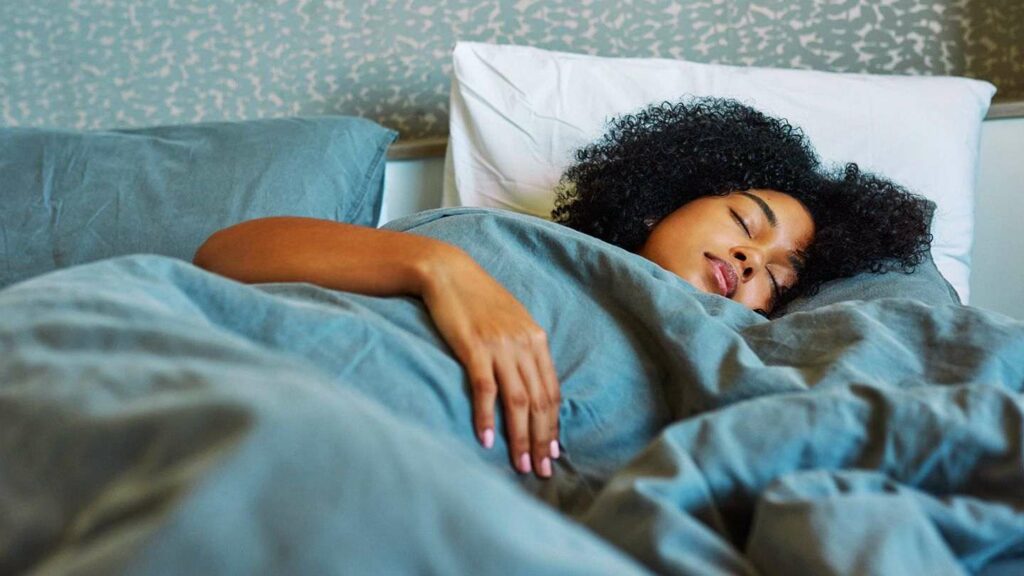As women enter the transformative phase of menopause, they often find themselves navigating a myriad of changes, both physical and emotional. One common struggle that accompanies this journey is disrupted sleep. While seeking professional advice is crucial, several natural remedies for menopausal sleep problems can complement conventional approaches. In this guide, we’ll explore these holistic solutions to help you reclaim the restful nights you deserve.
Contents
Natural Remedies For Menopausal Sleep Problems
 Natural remedies for menopausal sleep problems can offer effective relief without the side effects associated with certain medications. Here are some strategies to consider:
Natural remedies for menopausal sleep problems can offer effective relief without the side effects associated with certain medications. Here are some strategies to consider:
Maintain a Consistent Sleep Schedule
A regular sleep schedule is crucial for managing menopausal sleep problems. Going to bed and waking up at the same time every day helps regulate the body’s internal clock, known as the circadian rhythm. This consistency reinforces your natural sleep-wake cycle, making it easier to fall asleep and wake up naturally. Irregular sleep patterns can disrupt this cycle, leading to difficulty falling asleep and staying asleep, which is particularly common during menopause.
Create a Relaxing Bedtime Routine
Establishing a calming bedtime routine can signal to your body that it’s time to wind down. Engage in activities that promote relaxation, such as reading a book, taking a warm bath, or practicing mindfulness exercises. Avoid stimulating activities or exposure to bright screens at least an hour before bedtime, as these can interfere with the production of the sleep-inducing hormone melatonin.
Optimize Your Sleep Environment
The environment in which you sleep plays a significant role in the quality of your rest. Keep your bedroom cool, dark, and quiet. Invest in comfortable bedding and pillows that provide adequate support. Removing electronic devices and minimizing noise and light can create a conducive atmosphere for restful sleep. Additionally, consider blackout curtains to block out external light and reduce disruptions.
Herbal Remedies
Herbal remedies can be valuable allies in promoting better sleep during menopause. Valerian root, with its sedative properties, has been used for centuries to treat insomnia and improve sleep quality. Chamomile tea is another popular choice, known for its calming effects that can ease anxiety and induce relaxation. While these remedies are generally safe, it’s essential to consult with a healthcare professional before incorporating them into your routine, especially if you are taking other medications.
Mind-Body Techniques
Mind-body techniques are powerful tools for managing stress and promoting relaxation. Meditation, particularly mindfulness meditation, can help quiet the mind and reduce anxiety, making it easier to transition into sleep. Similarly, yoga combines gentle movement with deep-breathing exercises, fostering physical and mental relaxation. Integrating these practices into your daily routine, particularly in the evening, can contribute to improved sleep quality.
Nutritional Support
Nutrition plays a crucial role in sleep regulation. Consuming foods rich in tryptophan, such as turkey, nuts, and seeds, can contribute to the production of serotonin and melatonin—hormones that promote relaxation and sleep. Additionally, certain supplements, such as melatonin, magnesium, or calcium, may support sleep, but it’s essential to consult with a healthcare professional before incorporating them into your routine, as individual needs vary.
Regular Exercise
Regular physical activity is a cornerstone of overall health and can significantly impact sleep quality during menopause. Engaging in activities such as walking, swimming, or yoga not only helps regulate hormones but also promotes relaxation. Exercise contributes to the body’s natural circadian rhythm, enhancing the ability to fall asleep and enjoy more restorative sleep. However, it’s advisable to avoid vigorous exercise close to bedtime, as it may have a stimulating effect that can interfere with the initiation of sleep.
Stress Management
 Effective stress management is crucial for women experiencing menopausal sleep problems. Chronic stress can exacerbate hormonal imbalances and contribute to insomnia. Incorporating stress-reducing techniques into your daily routine, such as deep breathing, progressive muscle relaxation, or guided imagery, can help calm the nervous system. These practices not only aid in achieving better sleep but also contribute to an overall sense of well-being during the menopausal transition.
Effective stress management is crucial for women experiencing menopausal sleep problems. Chronic stress can exacerbate hormonal imbalances and contribute to insomnia. Incorporating stress-reducing techniques into your daily routine, such as deep breathing, progressive muscle relaxation, or guided imagery, can help calm the nervous system. These practices not only aid in achieving better sleep but also contribute to an overall sense of well-being during the menopausal transition.
Limit Stimulants
Managing your intake of stimulants, especially in the hours leading up to bedtime, is essential for addressing sleep disruptions. Caffeine, commonly found in coffee, tea, and certain sodas, can interfere with sleep. Limiting or avoiding caffeine in the afternoon and evening allows your body to wind down naturally. Similarly, being mindful of nicotine intake, as it is a stimulant, is crucial for minimizing potential sleep disturbances.
Stay Hydrated
While hydration is essential for overall health, it’s advisable to manage fluid intake closer to bedtime to prevent disruptions due to nighttime bathroom visits. Dehydration can lead to discomfort, but finding a balance ensures that you stay adequately hydrated without compromising your sleep. Aim to consume most of your fluids earlier in the day and reduce intake as bedtime approaches.
Aromatherapy
Aromatherapy, using essential oils like lavender or chamomile, can contribute to a calming bedtime routine. These scents are known for their relaxing and soothing properties, and incorporating them into your sleep environment can create a sensory cue for your body to prepare for rest. Whether through a diffuser, pillow spray, or topical application, aromatherapy offers a natural and pleasant way to promote relaxation before bedtime.
Acupuncture
Some women find relief from menopausal symptoms, including sleep problems, through acupuncture. This traditional Chinese medicine practice involves the insertion of thin needles into specific points on the body to promote balance and energy flow. While the mechanisms aren’t fully understood, some studies suggest that acupuncture may influence the nervous system, leading to improved sleep and a reduction in menopausal symptoms.
Incorporating these strategies into your routine can contribute to a comprehensive and holistic approach to managing menopausal sleep problems. It’s essential to personalize these recommendations based on your preferences and individual needs.
Does Menopause Insomnia Go Away?
Menopause-related insomnia can vary in duration and intensity among women. For some, insomnia may be a transient phase that resolves on its own, while for others, it can persist for an extended period. The hormonal fluctuations and changes in estrogen levels during menopause can contribute to sleep disturbances. Such as difficulty falling asleep, staying asleep, or experiencing restorative sleep.
However, as the body adapts to the new hormonal balance over time, some women may find that their sleep patterns gradually improve. Lifestyle adjustments, incorporating natural remedies, and practicing good sleep hygiene can contribute to managing menopausal insomnia effectively.
It’s important to note that individual experiences with menopause insomnia differ, and the duration of sleep disruptions can be influenced by various factors, including genetics, overall health, and lifestyle. In some cases, addressing underlying issues, such as stress, anxiety, or other health conditions, may be necessary to achieve long-term improvements in sleep quality.
When To Seek Medical Help For Menopausal Sleep Problems?
 Seeking medical help for menopausal sleep problems is advisable when the sleep disturbances become persistent, significantly impact your quality of life, or are accompanied by other concerning symptoms. Here are specific scenarios when seeking medical help is recommended:
Seeking medical help for menopausal sleep problems is advisable when the sleep disturbances become persistent, significantly impact your quality of life, or are accompanied by other concerning symptoms. Here are specific scenarios when seeking medical help is recommended:
Persistent Sleep Disturbances
If menopausal sleep problems persist for an extended period, such as several weeks or months, despite your efforts to address them through self-help strategies, it’s essential to seek professional guidance. Persistent insomnia can have various underlying causes that may require a thorough evaluation by a healthcare provider.
Severe Sleep Disruptions
If sleep disruptions are severe and significantly affect your daily functioning, mental health, or overall well-being, it’s crucial to consult with a healthcare professional. This includes instances where insomnia leads to excessive daytime sleepiness, difficulty concentrating, irritability, or mood disturbances.
Presence of Other Symptoms
If menopausal sleep problems are accompanied by other concerning symptoms, such as intense hot flashes, night sweats, mood swings, or changes in menstrual patterns, it’s important to discuss these issues with a healthcare provider. These symptoms may indicate hormonal imbalances or other medical conditions that require attention.
Impact on Physical Health
If sleep problems are negatively impacting your physical health, contributing to conditions such as high blood pressure, cardiovascular issues, or weight gain, seeking medical help is essential. Sleep is closely linked to overall health, and addressing sleep problems can have a positive impact on various aspects of well-being.
Underlying Health Conditions
If you have pre-existing health conditions that may contribute to or exacerbate sleep problems, such as anxiety, and depression, or sleep disorders like sleep apnea, it’s crucial to consult with a healthcare professional. Managing these underlying conditions can often improve sleep quality.
Medication Considerations
If natural remedies and lifestyle adjustments do not provide relief, and you are considering medications or supplements to address sleep problems, it’s essential to consult with a healthcare provider. They can guide the potential benefits and risks of specific medications, ensuring a safe and tailored approach.
Overall, seeking medical help for menopausal sleep problems is recommended when self-help strategies prove ineffective or are accompanied by other concerning symptoms. A healthcare professional can conduct a comprehensive evaluation, consider potential underlying causes, and work with you to develop an appropriate and personalized treatment plan.
Conclusion
In conclusion, managing sleep problems during menopause is a journey that involves exploring various natural remedies and lifestyle adjustments. From maintaining a consistent sleep schedule and creating a relaxing bedtime routine to incorporating herbal remedies, mind-body techniques, and nutritional support, there are numerous remedies for menopausal sleep problems. It’s crucial to be patient and open to trying different strategies, as what works can vary from person to person.
While these holistic approaches can provide relief for many women, seeking medical help is advisable if sleep problems persist or significantly impact daily life. Consulting with a healthcare professional ensures a personalized and comprehensive approach to addressing menopausal sleep challenges. If you are facing menopause-related issues, menopause treatment at HerMantra can help. Book your free trial online menopause treatment session now.


